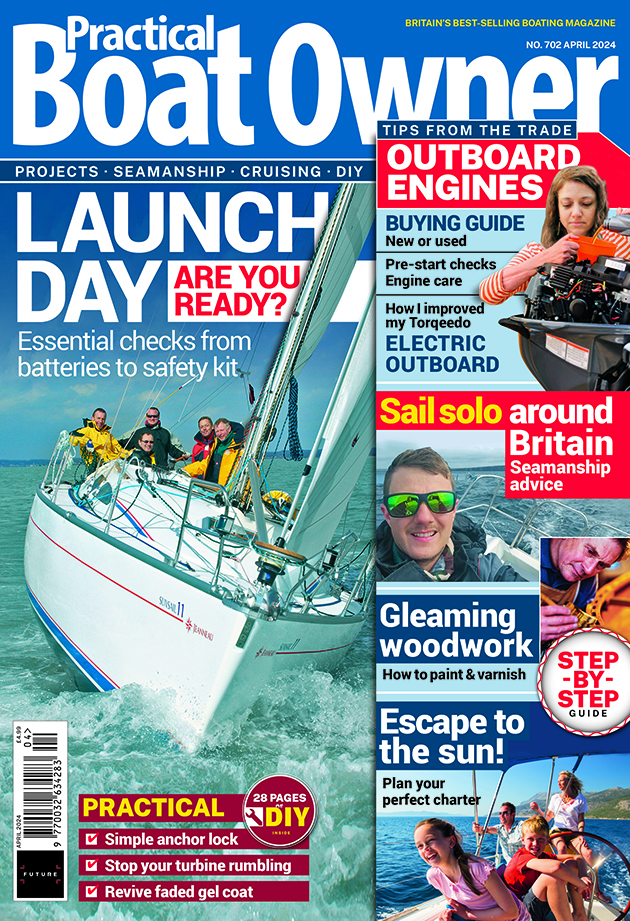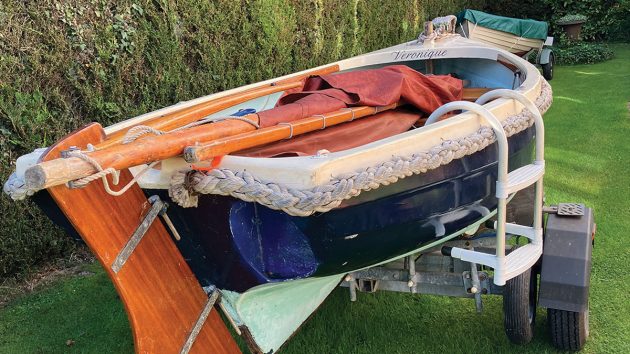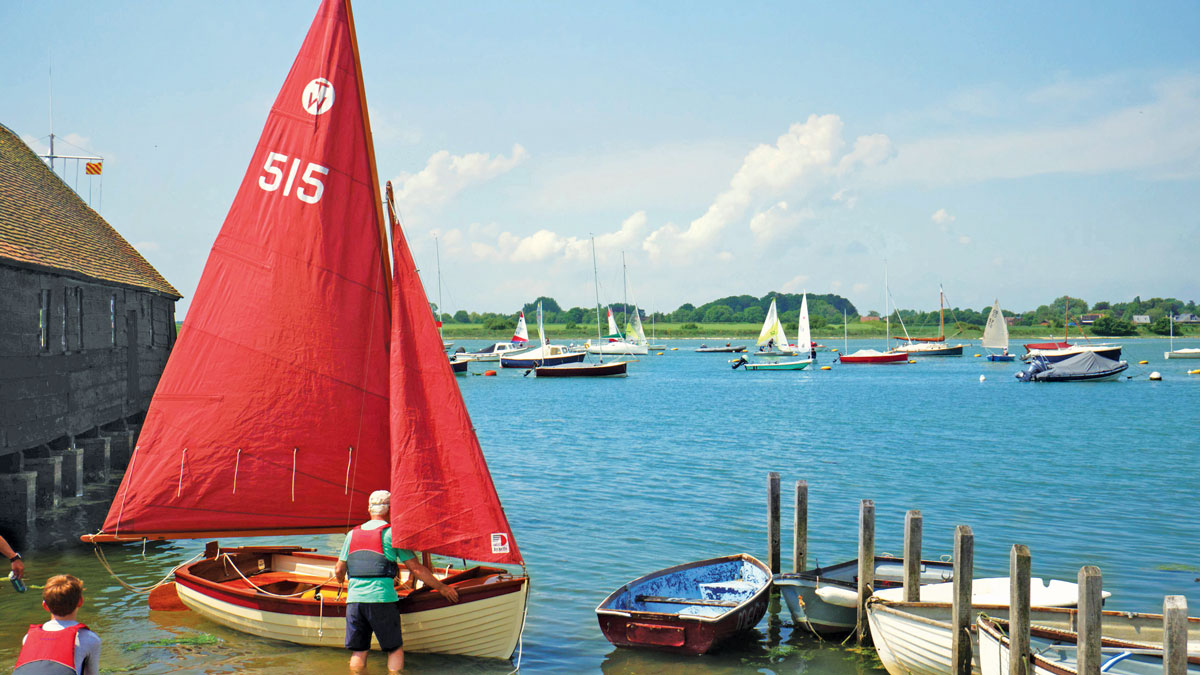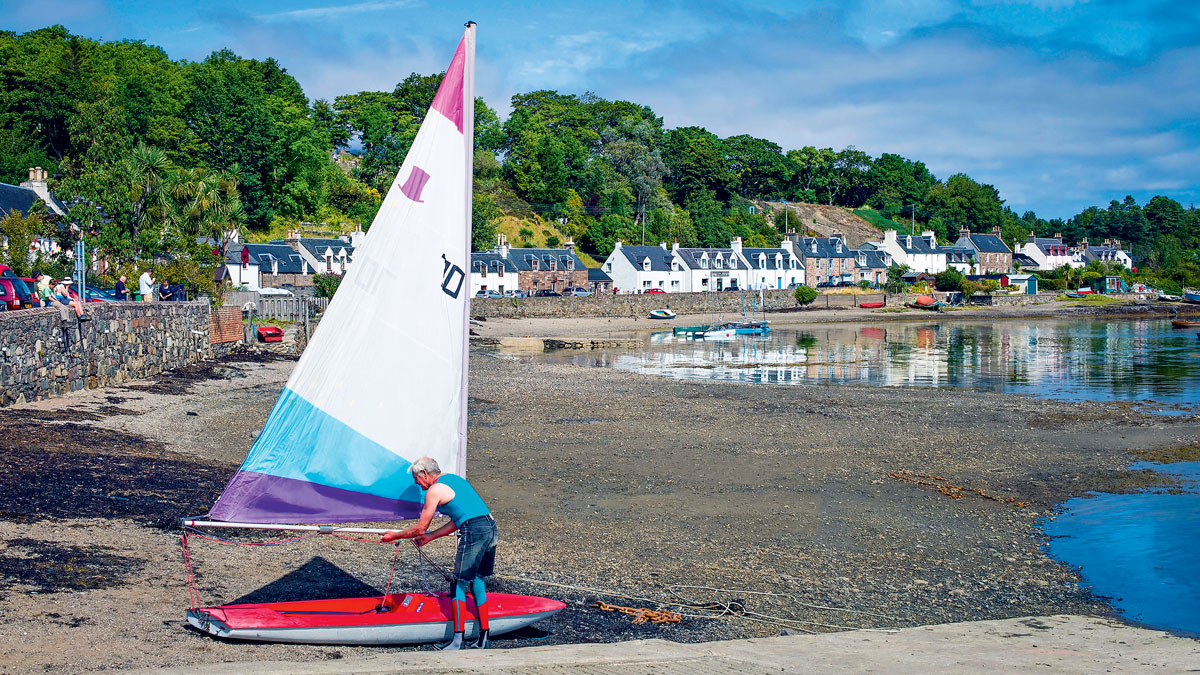A very interesting boat with a long keel, which makes it slightly unusual for a dinghy
When sailing a little open boat at sea there are times when an outboard engine can get you into a fast drying river or harbour when the wind has died and the ebbing tide is too strong for rowing.
Sail and oar boaters will plan to avoid this situation but, as we know, the ‘best- laid plans…’
In this situation, an outboard motor can help you to avoid a cold night afloat waiting for the next flood tide and hoping the weather remains manageable.
It does not hurt to have a back up and I keep my outboard on tickover when entering Rye Harbour in particular.

Tow hole at the base of the stem is great for launch and retrieval. Credit: Clive Marsh
The problem most small dinghies have is where to mount the outboard so as not to foul the tiller and mainsheet and not to spoil the trim of the boat.
Those cantilever-type mounts on a transom take a lot of weight aft and cause a small boat’s stern to drag.
Outboard wells are a much better alternative.
My Drascombe Dabber has a useful outboard well offset to port side.
I also have a (non standard) boom to the mainsail which enables central sheeting so there is little chance of the sheet fouling the motor or tiller. A great set up.
The Dabber is a fair-size boat and for a while, I have been looking for an 11-12ft dinghy that has an outboard well. But boats of this nature are rare as hen’s teeth.
Happy shopping
One day when scrolling through Apollo Duck advertisements I found Veronique, a Lune Pilot 11 with an outboard well and I did not hesitate to buy her.
The previous owner kindly delivered her to me.
For those unfamiliar with Lune Pilots they unusually (for a dinghy) have a long keel which is bound to make launch and recovery difficult.
She may also take longer to tack around.

Drawing of a 14ft Lune Pilot from the original Bailiff’s Character Boats Brochure
However, I decided to put up with these foibles in favour of her many advantages including the outboard well, ease of rigging, ample cockpit space created by the lack of a centreboard case, and long keel to ensure she holds a steady course.
Veronique is very easy to set up. A simple standing lug sail. No stays, the mast just slots onto the cockpit sole and is held in place at the thwart by a wooden pin.
A single halyard attached to a metal mast traveller hoists the yard and is cleated to a galvanised belaying pin. The boom has several sheeting positions and I chose initially to take it right aft.

The mast takes seconds to step onto the cockpit sole and is held in place at the thwart by a pin. The main halyard cleats off onto a galvanised belaying pin. Credit: Clive Marsh
A single halyard for the jib. No shackles on halyards just hooks, working boat fashion for quick release.
I will try central sheeting for when I use an outboard motor.
Lows and highs of a Lune Pilot 11
The trial launch was difficult. With a minimum draught close to knee height my wellies soon filled (I don’t wear them when afloat) and I struggled to get the boat to leave her trolley.
She is heavy and I need to figure out a better trailer/trolley combination.
The Dinghy Cruising Association Facebook group has useful ideas on such teething problems.
When I launched it was blowing a high end Force 4 so I put in a reef on the mainsail and did not bother with the jib.

Mast traveller with simple hook for main. I’d run out of leather so used some spare rope to protect the mast from the galvanised ring. Credit: Clive Marsh
I’d expected some trouble tacking but was pleasantly surprised that Veronique tacked freely under these conditions.
If the wind was lighter, I’m sure that with the full main and a backed jib she would come around easily enough.
I could help her by moving my human ballast to leeward. I particularly liked Veronique’s ability to hold a steady course.
Continues below…
Tideway 12: seaworthy and stable
Prolific boat owner Clive Marsh extols the virtues of the Tideway 12, which can be launched by hand from a
Sailing surfboats: Lasers, the Lightning 368 and more!
Clive Marsh looks at sailing surfboats - the Seabat, Minisprint, Lightning 368 and more!
Drascombe & Devon Lugger vs the Dabber
Designed for safe family boating under sail, or or power, but taken long distance by intrepid sailors, Clive Marsh looks…
Normandy Flobart & Sussex beach boats
Prolific boat owner Clive Marsh sings the praises of Sussex beach boats and their French sisters, the Normandy Flobarts
Her long keel provided a reassuring ride in these conditions.
With short steep waves, I do not believe the keel is long enough to cause tripping when sliding down the side of a wave as much as a long drop keel might when not raised.
Several racing dinghies were near and while I was not as close-winded my boat speed was not a lot different.
But speed is not what this type of traditional boat is all about.

This is a useful post for mooring or anchoring and is stepped onto the cockpit sole
I was more comfortable and secure than I would be on a tippy dinghy and she is better for taking out youngsters.
Stopping the boat to adjust my reefing was a pleasure.
She’s not skittish and the clear space without the clutter of a centreboard case enabled me to walk around the cockpit freely doing jobs and making tea.
She is a stable platform and would be ideal for fishing.
Conclusion
In short, I liked the sailing performance of this fine little boat and am pleased to own her.
A very good thing about her is the tow hole at the bottom of the stem by the keel. Working Sussex Beach boats have these and they make recovery a lot easier.
But like every boat I’ve owned there is always a niggle.
No boatbuilder gets it 100% right and this is why we spend time with modifications and fettling.

No drain plug. Water over the side collects into the deep bilge and is pumped out
I like to motor sail when entering a harbour from the sea and this is why I wanted an outboard well. The problem is that the propeller of the outboard in its well would foul the rudder and the tiller fouls the motor.
So, more fettling.
I’ve put a stop cord on the tiller to keep the rudder clear of the propeller, and I intend to laminate a curved tiller that will clear the motor.
Thinking of other solutions will keep me occupied when not sailing.
The great thing about a trailer sailer is I can do these jobs at home with all my tools available, rather than a cold winter boatyard miles away.
Lune Pilots come in 11ft, 12ft 3in and 14ft 6in sizes. Plus the Lune Whammel at 17ft and Lune Longboat at 17ft 8in. All are well made by Character Boats.
Specifications of the Lune Pilot 11
LOA: 11ft (3.36m) excluding bowsprit
Beam: 5ft 2in (1.58m)
Draught: 1ft 3in (0.38m)
Mast height: 11ft (3.36m) excluding yard
Sail area: 65ft2 (6m2)
Weight: (very approx) At least 290lb (132kg)
Construction: GRP with hard wood trim
Rig: Standing lug with jib (some are gaff cutters)
Builder: Character Boats
(These measurements are approximate and based on published data)
Enjoy reading Lune Pilot 11: a fine, little boat?

A subscription to Practical Boat Owner magazine costs around 40% less than the cover price.
Print and digital editions are available through Magazines Direct – where you can also find the latest deals.
PBO is packed with information to help you get the most from boat ownership – whether sail or power.
-
-
-
- Take your DIY skills to the next level with trusted advice on boat maintenance and repairs
- Impartial in-depth gear reviews
- Practical cruising tips for making the most of your time afloat
-
-
Follow us on Facebook, Instagram, TikTok and Twitter








